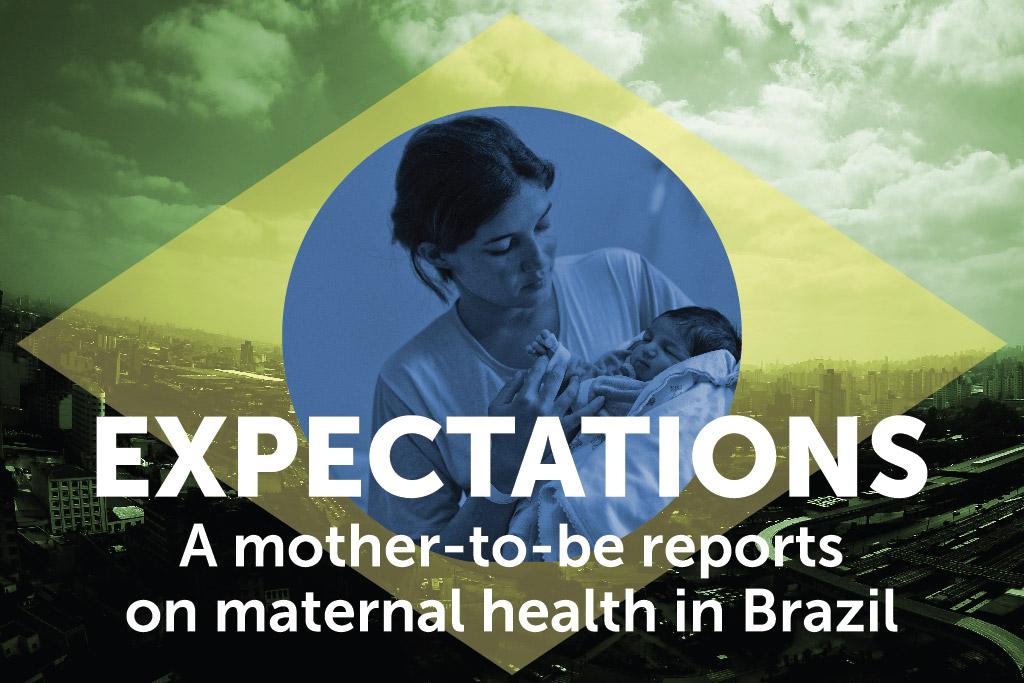Expectations: A mother-to-be heads to Brazil to report
SÃO PAULO, Brazil – “How are you feeling?” is a question I get a lot these days.
It’s the first one my doctor asks when I sit down on the examination table. It’s often the first that friends and family ask as soon as we hug hello. And it’s certainly the first that anyone asks – a colleague in the elevator, a neighbor on the plane, a fellow guest at a party – when they confirm that I am, indeed, pregnant.
As a journalist covering health, this is an unfamiliar exchange. I’m usually the one asking others how they are feeling. But pregnancy has flipped many of my usual habits on their heads.
My husband I found out we were expecting a baby – our first – late last year. As our excitement has built each day, so, too have the questions. Never before have others around me been so earnestly interested in hearing, recording and tracking the slightest of my physical changes or discomforts. And to be honest, never have I been so keenly sensitive to these daily fluctuations.
I’m reporting in Brazil with an interest in understanding how women experience pregnancy and childbirth. In this vast country nearly the size of the US, industrialization and modern luxuries reign. Sao Paulo is so packed with skyscrapers it makes Manhattan look quaint.
But when it comes to maternal health, progress has stalled. In Brazil, where abortion is illegal and caesarian sections outnumber vaginal births, maternal mortality rates are more than double that in the US and have hovered at the same figure since the mid-1990s, despite being largely preventable. I’m naturally curious, then, about prenatal care – a topic I’m beginning to feel much more attuned to than ever before.
My obstetrician is affiliated with one of the best hospitals in the nation, if not the world – Brigham and Women’s Hospital in Boston. Its gynecology department is particularly renowned, delivering nearly 8,000 babies each year. I placed my utmost trust in my doctor from our very first appointment, when I was given an exhaustive questionnaire with questions designed to identify early on any potential medical complications with the pregnancy. Some I expected (What is my family medical history? Do I drink or smoke?) but the nuance of others surprised me (Do I use a seatbelt? Do I go to the dentist regularly?)
In the last several months, I have had five regular visits, four ultrasounds, two appointments with my primary doctor and countless consultations with nurses on the phone and over email. And I have a relatively healthy pregnancy, fortunately. All the tests, questions and visits confirmed that I was fit enough to travel to Brazil in the fifth month of my pregnancy.
The focus of my trip here will be in urban areas, where 85 percent of Brazil’s nearly 200 million citizens live, according to the World Bank. But even with such proximity to cities – and Brazil’s designation as an upper-middle-income country – women here still face great risks to their health during pregnancy and childbirth.
An estimated 1,700 women die each year from pregnancy-related causes – more than double the number in the US, despite our greater population – accounting for one quarter of all maternal deaths in Latin America. What’s more disturbing: an estimated 90 percent of these deaths are preventable with appropriate prenatal care.
While tremendous progress was made through the mid-1990s to bring Brazil’s maternal mortality figures down, Brazil has stagnated on these reductions in recent years and is not on track to achieve the UN Millennium Development Goal to improve maternal health. As is the case around the world, including in the US, Brazil’s maternal health problems are greatest among the its poorest, most marginalized populations.
Under Brazil’s constitution, health is declared a human right for all, but this has not always been implemented. Just last month, the Brazilian government announced it would honor an unprecedented United Nations ruling that found the country violated the human rights of a poor Afro-Brazilian woman who died during childbirth in 2002, due to inadequate medical treatment.
Brazilian president Dilma Rousseff, has set about to improve maternal health. In late 2011, she enacted a new law designed to improve prenatal and postpartum care, requiring all women to register their pregnancy with the government. In exchange, the government provides pregnant women with R$50 (US$27) for transportation to ensure that they receive appropriate prenatal care.
But critics have expressed concern about the privacy compromises such required registration will entail and doubt the law will have any impact on improving maternal health.
In my read of the news on maternal health in Brazil, largely absent from the conversation have been the voices of the pregnant women themselves.
The question on my mind heading into this trip – the one I plan on asking the most in the coming weeks — is, how are the expecting women of Brazil feeling?
Marissa Miley is reporting from Brazil as a fellow with the International Reporting Project.
